Data Structures and Algorithms
- Introduction to Data Structures and Algorithms
- Time and Space Complexity Analysis
- Big-O, Big-Theta, and Big-Omega Notations
- Recursion and Backtracking
- Divide and Conquer Algorithm
- Dynamic Programming: Memoization vs. Tabulation
- Greedy Algorithms and Their Use Cases
- Understanding Arrays: Types and Operations
- Linear Search vs. Binary Search
- Sorting Algorithms: Bubble, Insertion, Selection, and Merge Sort
- QuickSort: Explanation and Implementation
- Heap Sort and Its Applications
- Counting Sort, Radix Sort, and Bucket Sort
- Hashing Techniques: Hash Tables and Collisions
- Open Addressing vs. Separate Chaining in Hashing
- DSA Questions for Beginners
- Advanced DSA Questions for Competitive Programming
- Top 10 DSA Questions to Crack Your Next Coding Test
- Top 50 DSA Questions Every Programmer Should Practice
- Top Atlassian DSA Interview Questions
- Top Amazon DSA Interview Questions
- Top Microsoft DSA Interview Questions
- Top Meta (Facebook) DSA Interview Questions
- Netflix DSA Interview Questions and Preparation Guide
- Top 20 DSA Interview Questions You Need to Know
- Top Uber DSA Interview Questions and Solutions
- Google DSA Interview Questions and How to Prepare
- Airbnb DSA Interview Questions and How to Solve Them
- Mobile App DSA Interview Questions and Solutions
DSA Interview Questions
- DSA Questions for Beginners
- Advanced DSA Questions for Competitive Programming
- Top 10 DSA Questions to Crack Your Next Coding Test
- Top 50 DSA Questions Every Programmer Should Practice
- Top Atlassian DSA Interview Questions
- Top Amazon DSA Interview Questions
- Top Microsoft DSA Interview Questions
- Top Meta (Facebook) DSA Interview Questions
- Netflix DSA Interview Questions and Preparation Guide
- Top 20 DSA Interview Questions You Need to Know
- Top Uber DSA Interview Questions and Solutions
- Google DSA Interview Questions and How to Prepare
- Airbnb DSA Interview Questions and How to Solve Them
- Mobile App DSA Interview Questions and Solutions
Data Structures and Algorithms
- Introduction to Data Structures and Algorithms
- Time and Space Complexity Analysis
- Big-O, Big-Theta, and Big-Omega Notations
- Recursion and Backtracking
- Divide and Conquer Algorithm
- Dynamic Programming: Memoization vs. Tabulation
- Greedy Algorithms and Their Use Cases
- Understanding Arrays: Types and Operations
- Linear Search vs. Binary Search
- Sorting Algorithms: Bubble, Insertion, Selection, and Merge Sort
- QuickSort: Explanation and Implementation
- Heap Sort and Its Applications
- Counting Sort, Radix Sort, and Bucket Sort
- Hashing Techniques: Hash Tables and Collisions
- Open Addressing vs. Separate Chaining in Hashing
- DSA Questions for Beginners
- Advanced DSA Questions for Competitive Programming
- Top 10 DSA Questions to Crack Your Next Coding Test
- Top 50 DSA Questions Every Programmer Should Practice
- Top Atlassian DSA Interview Questions
- Top Amazon DSA Interview Questions
- Top Microsoft DSA Interview Questions
- Top Meta (Facebook) DSA Interview Questions
- Netflix DSA Interview Questions and Preparation Guide
- Top 20 DSA Interview Questions You Need to Know
- Top Uber DSA Interview Questions and Solutions
- Google DSA Interview Questions and How to Prepare
- Airbnb DSA Interview Questions and How to Solve Them
- Mobile App DSA Interview Questions and Solutions
DSA Interview Questions
- DSA Questions for Beginners
- Advanced DSA Questions for Competitive Programming
- Top 10 DSA Questions to Crack Your Next Coding Test
- Top 50 DSA Questions Every Programmer Should Practice
- Top Atlassian DSA Interview Questions
- Top Amazon DSA Interview Questions
- Top Microsoft DSA Interview Questions
- Top Meta (Facebook) DSA Interview Questions
- Netflix DSA Interview Questions and Preparation Guide
- Top 20 DSA Interview Questions You Need to Know
- Top Uber DSA Interview Questions and Solutions
- Google DSA Interview Questions and How to Prepare
- Airbnb DSA Interview Questions and How to Solve Them
- Mobile App DSA Interview Questions and Solutions
Debugging-Based Interview Questions for Developers
Are you gearing up for a developer interview and feeling nervous about debugging questions? Don’t worry—you’re not alone! Debugging is a vital skill for developers, and it’s often a key focus in technical interviews. This guide will walk you through everything you need to know about debugging-based interview questions, from core concepts to practical strategies. Enhance your preparation with our free courses and stay updated with the latest tech insights by signing up now.
Why Debugging Matters in Interviews
Debugging is the process of finding and fixing errors in code, a skill every developer needs. Interviewers use debugging questions to evaluate your problem-solving abilities, technical knowledge, and how you handle pressure. These questions test not just your coding skills but also your ability to think logically and communicate your process.
- Key Point 1: Debugging questions assess critical thinking and problem-solving, essential for real-world software development.
- Key Point 2: They vary from conceptual (e.g., explaining terms) to practical (e.g., fixing code snippets).
- Key Point 3: Preparation involves practicing with tools and understanding common bugs, which can boost confidence.
Common Types of Questions
Debugging questions typically fall into two categories: conceptual and practical. Conceptual questions test your understanding of debugging terms and processes, while practical ones require you to troubleshoot specific issues or describe your debugging approach.
How to Prepare
To excel, practice debugging regularly, learn key tools like browser developer tools or language-specific debuggers, and simulate interview conditions. Familiarity with data structures and algorithms can also help, as many bugs relate to how data is processed.
For more resources, explore our Data Structures and Algorithms course to strengthen your foundation.
Introduction to Debugging in Interviews
Debugging is the art of identifying and resolving errors or bugs in software code. It’s a cornerstone of software development, as even seasoned developers encounter bugs regularly. In technical interviews, debugging questions are designed to gauge your ability to troubleshoot, think critically, and communicate effectively under time constraints.
Why is debugging so critical? Bugs are inevitable in software development, and the ability to resolve them efficiently saves time, reduces costs, and enhances product quality. Debugging also demonstrates your understanding of the codebase and technology stack, making it a key focus in interviews at companies like Stripe, Retool, and others.
In this comprehensive guide, we’ll cover common debugging interview questions, strategies for tackling them, real-world examples, and tips for preparation. Whether you’re a beginner or an experienced developer, this post will help you approach debugging questions with confidence.
Common Debugging Interview Questions
Debugging questions in interviews vary in scope and complexity. They can be broadly categorized into conceptual questions, which test your theoretical knowledge, and practical scenarios, which assess your hands-on troubleshooting skills.
Conceptual Questions
These questions focus on your understanding of debugging concepts and terminology.
- How is debugging different from testing?
- Testing verifies that software meets requirements by running it with various inputs to ensure correct behavior.
- Debugging involves identifying and fixing errors when testing reveals issues. It’s the next step after a test fails.
- What is a breakpoint, and when is it best to use it?
- A breakpoint pauses code execution at a specific line, allowing you to inspect variables and program state.
- Use breakpoints when you suspect a particular code section is problematic, enabling step-by-step analysis.
- What are some reasons to not fix a bug?
- The bug affects an obsolete feature scheduled for removal.
- Fixing it risks introducing new issues or breaking existing functionality.
- The bug’s impact is minor, and the cost of fixing outweighs the benefits.

Practical Debugging Scenarios
These questions require you to describe your debugging process or troubleshoot specific issues, often in real-world contexts.
- How do you debug a website?
- Use browser developer tools (e.g., Chrome DevTools) to check console logs for errors.
- Inspect HTML/CSS in the Elements tab for rendering issues.
- Analyze network requests to identify failed or slow resources.
- Test across browsers and devices to pinpoint compatibility issues.
- How do you debug a microservice-based application?
- Reproduce the issue and collect logs or error messages.
- Use monitoring tools (e.g., Jaeger, Zipkin) to trace data flow across services.
- Check individual services and their dependencies (e.g., databases) for issues.
- Describe an important debug you’ve done.
- Example: “I resolved a race condition in a multi-threaded application using gdb to step through code and logs to identify thread conflicts. I implemented a locking mechanism to synchronize resource access.”
- How do you debug SQL procedures?
- Use logging or print statements to track variable values and query execution.
- Step through the procedure with database-specific debugging tools.
- Check for logical errors, such as incorrect joins or missing conditions.

- How do you debug a memory leak?
- Use tools like Valgrind or AddressSanitizer to detect leaks.
- Review code for missing free or delete calls.
- Monitor memory usage to identify patterns over time.

Question Type | Example Question | Key Skills Tested |
Conceptual | How is debugging different from testing? | Understanding of software development processes |
Practical | How do you debug a website? | Hands-on troubleshooting, tool usage |
Scenario-Based | Describe an important debug you’ve done | Real-world problem-solving, communication |
How to Approach Debugging Questions in Interviews
Tackling debugging questions requires a structured approach. Here’s how to handle them effectively, based on best practices from sources like GeeksforGeeks.
Before Starting to Debug
- Gather Information: Collect error messages, logs, user reports, and steps to reproduce the issue.
- Define the Scope: Identify the affected system component to narrow down the search.
- Reproduce the Issue: Consistently replicate the bug to understand its conditions.
- Understand the Code: Review the codebase, documentation, or tests to grasp its structure and logic.
During Debugging
- Start Simple: Check for obvious issues like syntax errors or null pointer exceptions.
- Divide and Conquer: Isolate code sections to pinpoint the bug’s location.
- Use Debugging Tools: Employ debuggers (e.g., gdb, pdb), profilers, or linters to inspect code behavior.
- Log Steps: Document your actions to avoid repetition and clarify your process for interviewers.
- Take Breaks: Step away briefly if stuck to gain a fresh perspective.
Common Challenges and Mistakes
Debugging can be tricky, especially under interview pressure. Common challenges include:
- Identifying the Root Cause: Bugs may have multiple symptoms, complicating diagnosis.
- Reproducing Issues: Intermittent bugs are hard to replicate consistently.
- Time Constraints: Interview time limits can lead to rushed decisions.
- Overlooking Obvious Fixes: Simple solutions are sometimes missed in complex analysis.
Mistakes to avoid:
- Jumping to conclusions without thorough investigation.
- Ignoring logs or error messages.
- Making untested changes.
- Failing to document steps or comment code.
- Not taking breaks when stuck.
Examples of Debugging Interview Questions and Solutions
Here are detailed examples to illustrate how to approach debugging questions.
Example 1: Debugging a Website
Question: A website isn’t loading properly on some browsers. How would you debug it?
Solution:
- Reproduce the issue across browsers (e.g., Chrome, Firefox, Safari) and devices.
- Open browser developer tools and check the Console tab for JavaScript errors.
- Use the Elements tab to inspect HTML/CSS for rendering issues.
- Check the Network tab for failed requests or slow resources.
- Validate code with tools like W3C Validator.
- Test browser-specific features to identify compatibility issues.
Why It Works: This systematic approach covers client-side issues, from JavaScript errors to network problems, ensuring thorough debugging.
Example 2: Debugging a Microservice
Question: A microservice returns 500 errors intermittently. How do you debug it?
Solution:
- Check logs for error messages or stack traces.
- Use monitoring tools to detect spikes in error rates or latency.
- Trace requests with tools like Jaeger to identify failure points.
- Verify dependencies (e.g., databases, APIs) are functioning.
- Stress test the service to replicate the issue under load.
- Review recent code changes for potential bugs.
Why It Works: This method combines log analysis, monitoring, and code review to address distributed system complexities.
Preparing for Debugging Interviews
To excel in debugging interviews, preparation is key. Here are actionable steps:
- Practice Regularly: Debug code in personal projects or open-source repositories.
- Master Debugging Tools: Learn tools like gdb (C++), pdb (Python), or Chrome DevTools for web development.
- Study Common Bugs: Understand issues like memory leaks, race conditions, or null pointer exceptions.
- Simulate Interview Conditions: Practice debugging under time constraints to mimic interview pressure.
- Reflect on Past Experiences: Prepare to discuss real-world debugging scenarios you’ve encountered.
Strengthening your foundation in related areas, such as data structures and algorithms or system design, can also enhance your debugging skills, as many bugs stem from data handling or architectural issues.
For quick, intensive learning, try our Crash Course to boost your skills fast.
Conclusion
Debugging is more than fixing bugs—it’s about understanding code, solving problems, and preventing future issues. Mastering debugging-based interview questions can set you apart as a developer, showcasing your technical and analytical skills.
By familiarizing yourself with common questions, adopting a structured approach, and practicing regularly, you’ll be well-equipped to tackle any debugging challenge in an interview. For further growth, explore our Data Science course to dive deeper into analytical problem-solving or our comprehensive Master DSA, Web Dev, and System Design course for a holistic tech education.
FAQs
How can I improve my debugging skills?
Testing verifies software functionality, while debugging identifies and fixes errors found during testing.
How can I improve my debugging skills?
Practice debugging, learn tools like gdb or Chrome DevTools, study common bugs, and simulate interview scenarios.
Why do interviewers ask debugging questions?
They evaluate problem-solving, adaptability, communication, and attention to detail, predicting job performance.
What are some common debugging tools?
Debuggers (gdb, pdb), browser developer tools, logging frameworks, and profilers like Valgrind.
How do I handle time pressure in a debugging interview?
Stay calm, use a systematic approach, start with simple checks, and explain your thought process clearly.

DSA, High & Low Level System Designs
- 85+ Live Classes & Recordings
- 24*7 Live Doubt Support
- 400+ DSA Practice Questions
- Comprehensive Notes
- HackerRank Tests & Quizzes
- Topic-wise Quizzes
- Case Studies
- Access to Global Peer Community
Buy for 52% OFF
₹25,000.00 ₹11,999.00
Accelerate your Path to a Product based Career
Boost your career or get hired at top product-based companies by joining our expertly crafted courses. Gain practical skills and real-world knowledge to help you succeed.
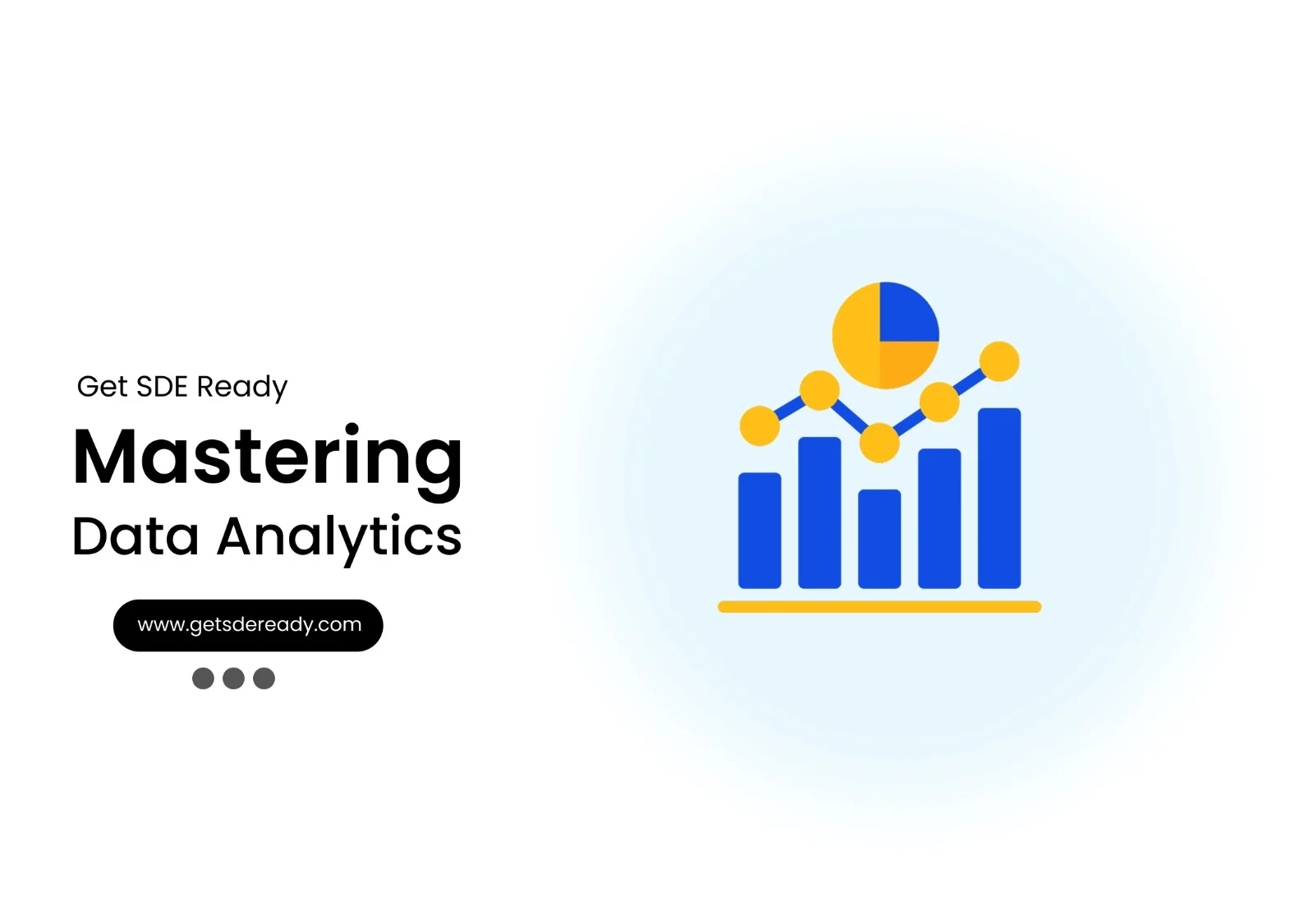
Data Analytics
- 20+ Live Classes & Recordings
- 24*7 Live Doubt Support
- 15+ Hands-on Live Projects
- Comprehensive Notes
- Real-world Tools & Technologies
- Access to Global Peer Community
- Interview Prep Material
- Placement Assistance
Buy for 70% OFF
₹9,999.00 ₹2,999.00
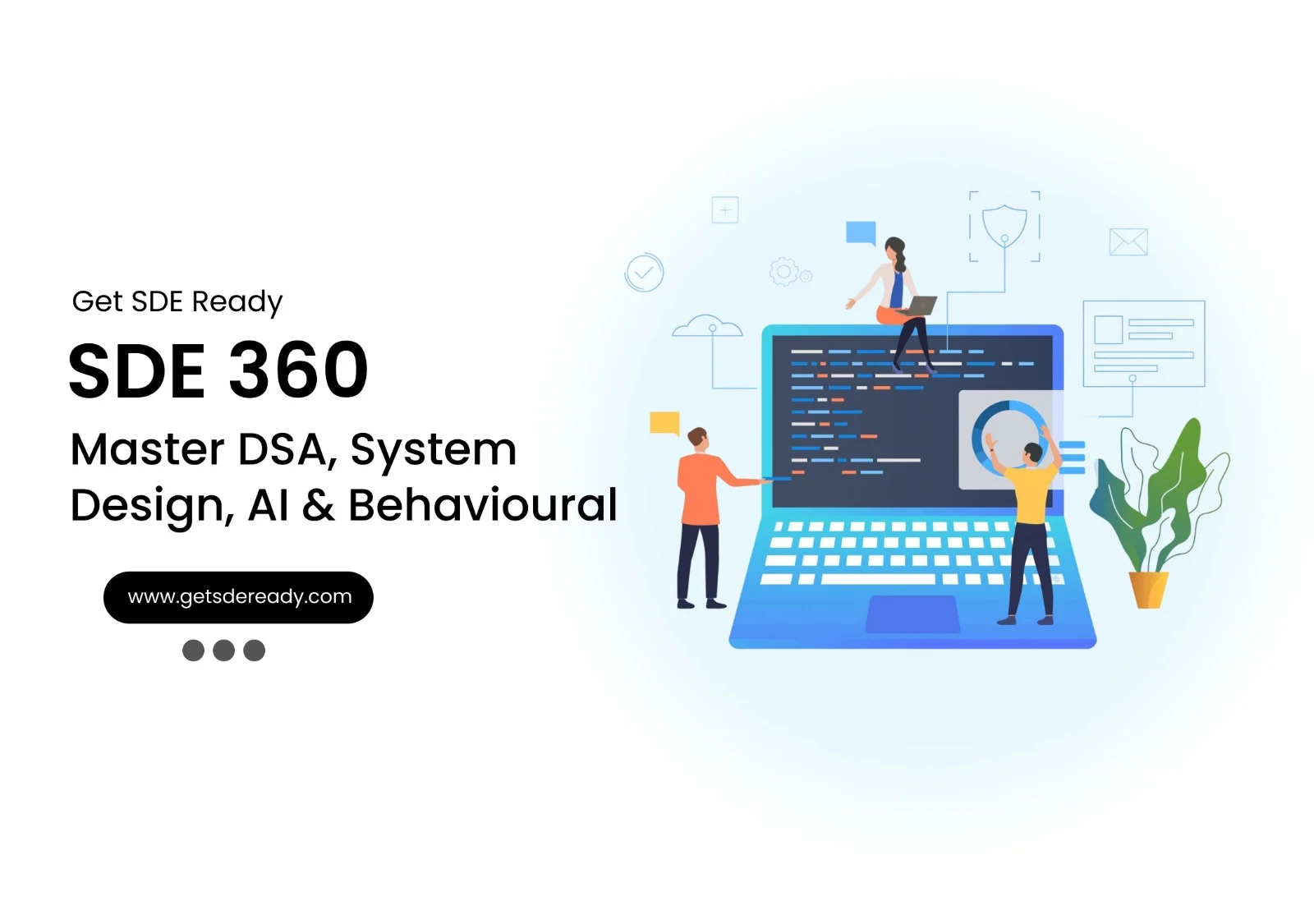
SDE 360: Master DSA, System Design, AI & Behavioural
- 100+ Live Classes & Recordings
- 24*7 Live Doubt Support
- 400+ DSA Practice Questions
- Comprehensive Notes
- HackerRank Tests & Quizzes
- Topic-wise Quizzes
- Case Studies
- Access to Global Peer Community
Buy for 50% OFF
₹39,999.00 ₹19,999.00
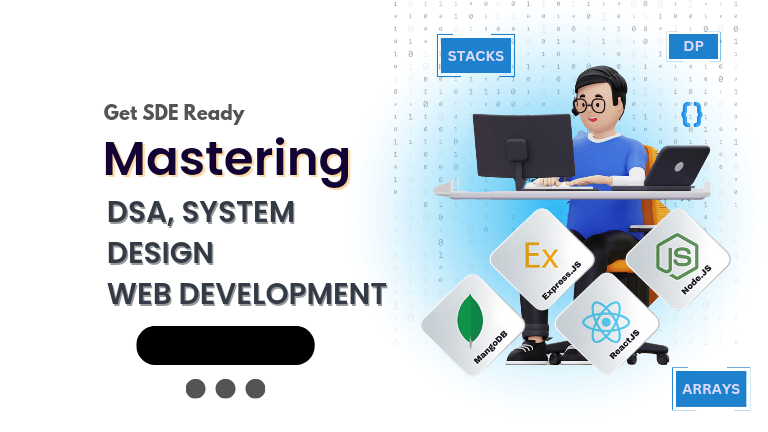
Fast-Track to Full Spectrum Software Engineering
- 120+ Live Classes & Recordings
- 24*7 Live Doubt Support
- 400+ DSA Practice Questions
- Comprehensive Notes
- HackerRank Tests & Quizzes
- 12+ live Projects & Deployments
- Case Studies
- Access to Global Peer Community
Buy for 51% OFF
₹35,000.00 ₹16,999.00

DSA, High & Low Level System Designs
- 85+ Live Classes & Recordings
- 24*7 Live Doubt Support
- 400+ DSA Practice Questions
- Comprehensive Notes
- HackerRank Tests & Quizzes
- Topic-wise Quizzes
- Case Studies
- Access to Global Peer Community
Buy for 52% OFF
₹25,000.00 ₹11,999.00
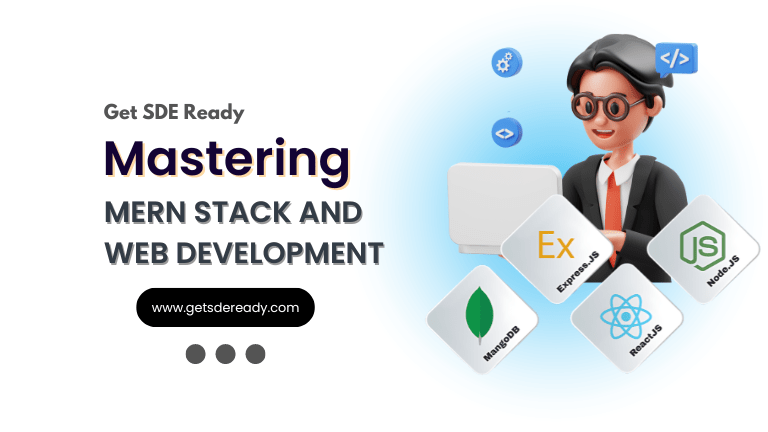
Mastering Mern Stack (WEB DEVELOPMENT)
- 65+ Live Classes & Recordings
- 24*7 Live Doubt Support
- 12+ Hands-on Live Projects & Deployments
- Comprehensive Notes & Quizzes
- Real-world Tools & Technologies
- Access to Global Peer Community
- Interview Prep Material
- Placement Assistance
Buy for 53% OFF
₹15,000.00 ₹6,999.00
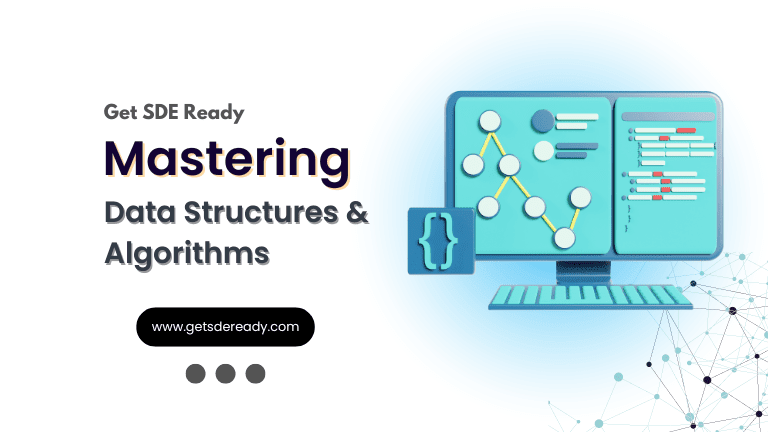
Mastering Data Structures & Algorithms
- 65+ Live Classes & Recordings
- 24*7 Live Doubt Support
- 400+ DSA Practice Questions
- Comprehensive Notes
- HackerRank Tests
- Access to Global Peer Community
- Topic-wise Quizzes
- Interview Prep Material
Buy for 40% OFF
₹9,999.00 ₹5,999.00
Reach Out Now
If you have any queries, please fill out this form. We will surely reach out to you.
Contact Email
Reach us at the following email address.
arun@getsdeready.com
Phone Number
You can reach us by phone as well.
+91-97737 28034
Our Location
Rohini, Sector-3, Delhi-110085